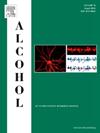暴饮暴食发作期间的酒精摄入量及其与暴饮暴食谱系障碍成年人饮酒模式和酒精问题的关系
IF 2.9
4区 医学
Q3 PHARMACOLOGY & PHARMACY
引用次数: 0
摘要
暴食谱系障碍(BSEDs)患者临床报告在暴食发作期间饮酒,但尚未进行实证研究。在暴饮暴食期间饮酒可能会加剧食物的过度消费,以及对暴饮暴食的内疚或悲伤感。因此,描述这种共同发生的行为是重要的第一步,有助于了解暴饮暴食的潜在因素。目前的研究旨在描述成年bsed患者暴食发作期间的酒精使用情况,并确定这种共存与人口统计学特征或临床症状之间的关系。参与者(N = 203)报告了暴食发作期间饮酒的频率和平均数量、人口统计指标、饮食失调症状、一般酒精使用和酒精问题以及抑郁症状。三分之一的参与者承认在过去三个月的暴食期间饮酒,最常见的频率是“很少”,典型的饮酒数量在1到4杯之间。暴饮暴食期间饮酒频率越高,通常饮酒频率越高,典型饮酒期间饮酒次数越多,酒精问题也越多。这项研究的发现表明,饮酒模式和暴饮暴食之间存在潜在的联系,这对治疗酗酒患者的提供者来说可能具有临床意义。需要在临床严重程度和人口统计学差异较大的样本中,对酒精和暴饮暴食同时发生的有效措施进行更多的研究。本文章由计算机程序翻译,如有差异,请以英文原文为准。
Alcohol consumption during binge-eating episodes and associations with drinking patterns and alcohol problems among adults with binge-spectrum eating disorders
Individuals with binge-spectrum eating disorders (BSEDs) clinically report drinking alcohol during binge-eating episodes, but no empirical research has yet been conducted. Drinking alcohol during binge-eating episodes may exacerbate overconsumption of food and feelings of guilt or sadness in response to binge eating. Characterizing this co-occurring behavior is therefore an important first step and contribution to knowledge about a potential contributor to binge eating. The current study aimed to characterize alcohol use during binge-eating episodes among adults with BSEDs and determine the relationship between this co-occurrence and demographic characteristics or clinical symptoms. Participants (N = 203) reported the frequency and average number of drinks consumed during binge-eating episodes, demographic measures, eating disorder symptomology, general alcohol use and alcohol problems, and depression symptoms. One-third of participants endorsed drinking alcohol during binge-eating episodes in the past three months, with the most common frequency being “rarely” and the typical number of drinks ranging from 1 to 4 drinks. Higher frequency of alcohol consumption during binge-eating episodes was associated with more frequent drinking generally, greater number of drinks during typical drinking episodes, and greater number of alcohol problems. The study's findings indicate potential associations between alcohol use patterns and binge eating, which could be clinically relevant for providers treating patients who consume alcohol. More research is needed with validated measures of co-occurring alcohol and binge eating episodes and in samples with greater variability of clinical severity and demographics.
求助全文
通过发布文献求助,成功后即可免费获取论文全文。
去求助
来源期刊

Alcohol
医学-毒理学
CiteScore
4.60
自引率
4.30%
发文量
74
审稿时长
15.6 weeks
期刊介绍:
Alcohol is an international, peer-reviewed journal that is devoted to publishing multi-disciplinary biomedical research on all aspects of the actions or effects of alcohol on the nervous system or on other organ systems. Emphasis is given to studies into the causes and consequences of alcohol abuse and alcoholism, and biomedical aspects of diagnosis, etiology, treatment or prevention of alcohol-related health effects.
Intended for both research scientists and practicing clinicians, the journal publishes original research on the neurobiological, neurobehavioral, and pathophysiological processes associated with alcohol drinking, alcohol abuse, alcohol-seeking behavior, tolerance, dependence, withdrawal, protracted abstinence, and relapse. In addition, the journal reports studies on the effects alcohol on brain mechanisms of neuroplasticity over the life span, biological factors associated with adolescent alcohol abuse, pharmacotherapeutic strategies in the treatment of alcoholism, biological and biochemical markers of alcohol abuse and alcoholism, pathological effects of uncontrolled drinking, biomedical and molecular factors in the effects on liver, immune system, and other organ systems, and biomedical aspects of fetal alcohol spectrum disorder including mechanisms of damage, diagnosis and early detection, treatment, and prevention. Articles are published from all levels of biomedical inquiry, including the following: molecular and cellular studies of alcohol''s actions in vitro and in vivo; animal model studies of genetic, pharmacological, behavioral, developmental or pathophysiological aspects of alcohol; human studies of genetic, behavioral, cognitive, neuroimaging, or pathological aspects of alcohol drinking; clinical studies of diagnosis (including dual diagnosis), treatment, prevention, and epidemiology. The journal will publish 9 issues per year; the accepted abbreviation for Alcohol for bibliographic citation is Alcohol.
 求助内容:
求助内容: 应助结果提醒方式:
应助结果提醒方式:


